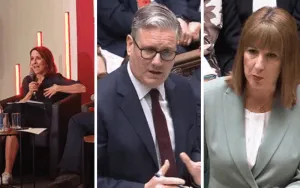Disabled people were not mentioned once in the first major television event of the general election campaign, despite the participants speaking more than 21,000 words over more than two hours.
Analysis of transcripts of the leaders’ debate between Rishi Sunak and Keir Starmer, followed by interviews with Ed Davey, Stephen Flynn, Richard Tice and Adrian Ramsay, shows none of them, and neither of the two journalists moderating the debate or interviewing the leaders, mentioned disabled people or disability.
The one exception to the sidelining of disability from the two programmes broadcast by ITV on Tuesday evening was in its treatment of social care, but even this received only cursory attention and disabled people were not mentioned directly.
Social care was mentioned in the leaders’ debate after a question was put by ITV’s Julie Etchingham to Sunak and Starmer.
And when Davey was interviewed later by ITV’s Anushka Asthana, he gave his party’s call for an end to charging for personal care for all adults, and a higher minimum wage for care workers, as an example of a Liberal Democrat manifesto policy (see separate story).
The sidelining of disabled people during the leaders’ debate and interviews came just two days after Kamran Mallick, chief executive of Disability Rights UK, said it was “astonishing and appalling” – and that political parties appeared to be “living in a parallel universe” – that disabled people had been ignored in the first 10 days of the election campaign.
The section on social care during the leaders’ debate (pictured) lasted approximately one minute and five seconds, and there was no cross-examination of the answers provided by Sunak and Starmer.
Etchingham had asked them: “Five years ago, Boris Johnson was standing where you both are now. He told me there was a plan ready to go on this.
“We’re still waiting. Will you both now commit to a fully-funded solution in your manifesto this time round?”
Sunak claimed the government had “already implemented charging reform” but then added: “Pilots are in place to implement the reforms. They will be rolled out later this year.”
These long-awaited government reforms were widely seen as regressive and unfair but would have introduced a lifetime cap of £86,000 on how much anyone paid for social care in England.
Two years ago, the government delayed their introduction from October 2023 to October 2025.
But in January this year, the permanent secretary of the Department of Health and Social Care, Sir Chris Wormald, told the Commons public accounts committee that the government could be forced into further delays if it decided under-pressure councils would not be able to cope with the “big new chunk” of “complicated work”.
It is not yet clear whether the Conservative manifesto will stick to the October 2025 date for the rollout of the reforms, with pilot projects later this year.
Sunak then said that his Conservative government had provided “an extra eight billion” for social care because “the pressures are immediate”.
This appears to refer to the £7.5 billion funding provided for adult and children’s social care (PDF) over 2023-24 and 2024-25 – although only £2.7 billion of this was new central government funding – that was announced in November 2022 when the government said its charging reforms would be delayed, although some of this money went to the NHS.
The other £500 million of the £8 billion appears to refer to new funding for social care announced by the government in January.
The Association of Directors of Adult Social Services said later that this extra funding “simply isn’t enough to meet rising costs and growing numbers of adults needing care and support this year” and that social care “needs a long-term, sustainable, fully-funded plan”.
The National Audit Office said last November (PDF) that the government had “delayed its charging reforms, scaled back system reform, and is behind on some aspects of its revised plan”.
Starmer focused, as his party has in recent years, on the need to improve conditions for care workers, rather than any attempt to end care charges or increase the availability of funding for disabled people in need of care and support.
He told the audience: “We will have a plan for social care that, like everything else in our manifesto, it’ll be fully costed and fully funded.”
He said the focus on care workers was because “one of the biggest problems in social care is that the workforce has fragmented”, with “poor conditions of many, many people”.
Research by disabled campaigners showed in 2022 that tens of thousands of disabled people across the country every year were having debt collection action taken against them by their local authorities over unpaid care charges.
A note from the editor:
Please consider making a voluntary financial contribution to support the work of DNS and allow it to continue producing independent, carefully-researched news stories that focus on the lives and rights of disabled people and their user-led organisations.
Please do not contribute if you cannot afford to do so, and please note that DNS is not a charity. It is run and owned by disabled journalist John Pring and has been from its launch in April 2009.
Thank you for anything you can do to support the work of DNS…

 Government offers three clues that it is set to plough ahead with cuts to disability benefits
Government offers three clues that it is set to plough ahead with cuts to disability benefits Anger and concern over government’s ‘hand-me-down’ employment white paper
Anger and concern over government’s ‘hand-me-down’ employment white paper Labour silence over PM’s work search comments, as Tory ex-DWP minister says: ‘You’d never have heard that from me’
Labour silence over PM’s work search comments, as Tory ex-DWP minister says: ‘You’d never have heard that from me’